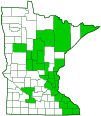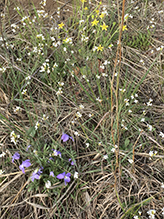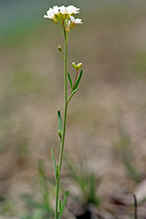lyre-leaved rock cress
(Arabidopsis lyrata ssp. lyrata)
Conservation • Wetland • Description • Habitat • Ecology • Use • Distribution • Taxonomy
Description |
Lyre-leaved rock cress is a 4″ to 16″ tall, erect, biennial or perennial forb that rises from a taproot rhizome. The stems are upright or ascending, branched from the base. The lower stem is covered with coarse, stiff hairs. Basal leaves are lyre-shaped, with a large terminal lobe and lateral lobes progressively smaller toward the base. There is a pair of ear-shaped lobes at the base of the leaf. The leaves are ¾″ to 1½″ long and form a rosette. Stem leaves are alternate, linear or narrowly spatula-shaped, widest at the blunt tip, narrowing to the base. The lowest stem leaves may have a few short teeth or lobes, the remaining are unlobed and untoothed. They are attached to the stem without leaf stalks. The inflorescence is a short, loose, branched cluster at the end of the stem and branches. The flowers are ¼″ to ½″ wide, with 4 white to greenish-white petals. They are on ¼″ to ⅔″ long, ascending, flower stalks. The petals are ⅛″ to ⅓″ long, much longer than the sepals. There are 6 stamens. The fruit is a thin, flat pod, ¾″ to 1¾″ long, on a ¼″ to ⅔″ long stalk, spreading outward and pointing upward. |
Height |
4″ to 16″ |
Flower Color |
White or greenish white |
Similar Species |
The rosette of lyre-shaped basal leaves, linear stem leaves, and large flowers are diagnostic for this species. Mouse-ear cress (Arabidopsis thaliana) basal leaves are unlobed. The flowers are much smaller. |
Habitat |
Dry. Woods, fields, sand dunes. |
Ecology |
Flowering |
April to July |
Pests and Diseases |
|
Defense Mechanisms |
This and other mustards (family Brassicaceae) produce chemical compounds when cells are damaged that are toxic to most animals, fungi, and bacteria. |
Use |
|
Distribution |
||
|
Sources |
|
| 4/20/2024 | ||
Nativity |
||
Native |
||
Occurrence |
||
|
||
Taxonomy |
|
Kingdom |
|
Subkingdom |
Pteridobiotina |
Phylum |
Tracheophyta (Vascular Plants) |
Class |
|
Order |
Brassicales (Mustards, Capers, and Allies) |
Family |
Brassicaceae (Mustard) |
| Subfamily | Brassicoideae |
| Supertribe | Camelinodae |
Tribe |
Arabidopsideae |
Genus |
Arabidopsis |
A recent study (German et al., March 2023) proposed a new and “novel” classification scheme for the family Brassicaceae. The authors divided the family into two subfamilies, five supertribes, and 58 tribes. A later study (Hendricks et al., October 2003) presented a new complete evolutionary history (phylogeny) of Brassicaceae based on molecular DNA. The later study strongly supports the reordering. In the new classification, Arabidopsis is the only genus in the new tribe Arabidopsideae. |
|
Subordinate Taxa |
|
|
|
Synonyms |
|
Arabis lyrata Arabis lyrata var. lyrata |
|
Common Names |
|
lyrate rockcress lyre-leaf rock-cress lyre-leaved rock-cress lyre-leaved rock cress lyreleaf rockcress |
|
Glossary
Ascending
Growing upward at an angle or curving upward from the base.
Linear
Long, straight, and narrow, with more or less parallel sides, like a blade of grass.
Visitor Photos |
||
Share your photo of this plant. |
||
This button not working for you? |
||
Luciearl |
 |
lyre rock cress Several years in a row, in early spring, I come across this tiny delicate flower. It's difficult to get a clear picture. (I'll try again this year) |
Nancy Falkum |
||
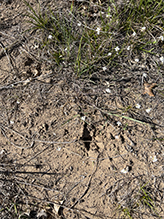 |
||
Bird’s Foot Violet, Hairy Puccoon, and Lyre Leaved Rock Cress |
||
Greg Watson |
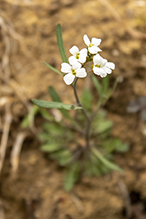 |
MinnesotaSeasons.com Photos |
||
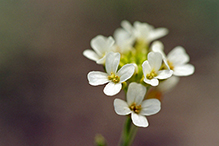 |

Slideshows |
|

Visitor Videos |
||
Share your video of this plant. |
||
This button not working for you? |
||
|
Other Videos |
||
|

Visitor Sightings |
||
Report a sighting of this plant. |
||
This button not working for you? |
||
Luciearl |
Location: East Gull Lake, Cass County Several years in a row, in early spring, I come across this tiny delicate flower. It's difficult to get a clear picture. (I'll try again this year) |
 |
| Nancy Falkum 5/27/2022 |
Location: Kellogg Weaver Dunes SNA, Weaver Dunes Unit |
 |
| Greg Watson 4/29/2022 |
Location: Vetsch Park |
 |
| Nancy Falkum 5/9/2017 |
Location: Kellogg Weaver Dunes SNA, Weaver Dunes Unit Bird’s Foot Violet, Hairy Puccoon, and Lyre Leaved Rock Cress |
 |
Laura Dekeyrel |
Location: Perrot State Park, Trempealeau WI |
MinnesotaSeasons.com Sightings |
||

|
Created: Last Updated: © MinnesotaSeasons.com. All rights reserved. |
